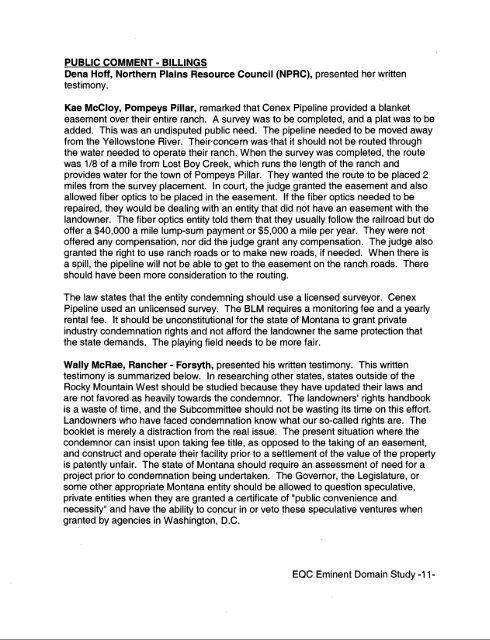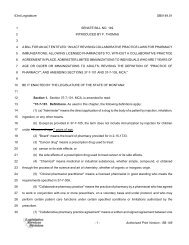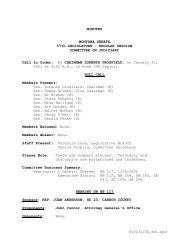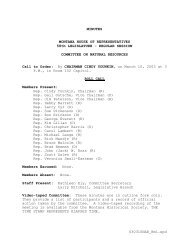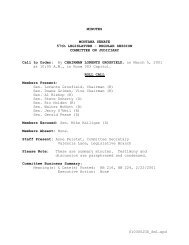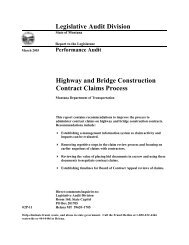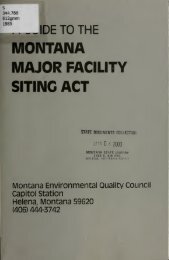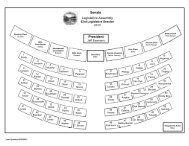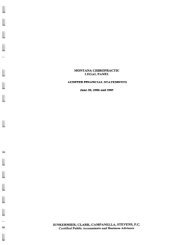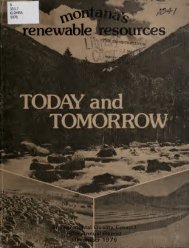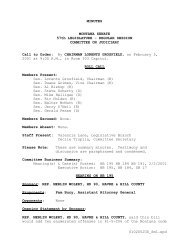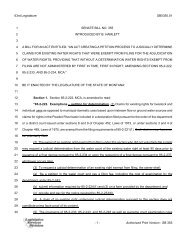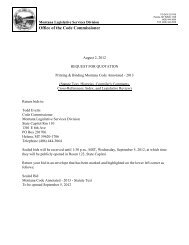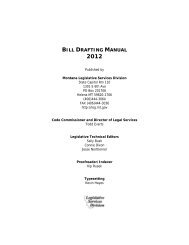Public Comment. Volume III - Montana Legislature
Public Comment. Volume III - Montana Legislature
Public Comment. Volume III - Montana Legislature
Create successful ePaper yourself
Turn your PDF publications into a flip-book with our unique Google optimized e-Paper software.
PUBI-IC COMMENT - BILLINGS<br />
Dena Hoff, Northern Plains Resource Council (NPRC), presented her written<br />
testimony.<br />
Kae McCloy, Pompeys Pillar, remarked that Cenex Pipeline provided a blanket<br />
easement over their entire ranch. A survey was to be completed, and a plat was to be<br />
added. This was an undisputed public need. The pipeline needed to be moved away<br />
from the Yellowstone River. Their-concern was that it should not be routed through<br />
the water needed to operate their ranch. When the survey was completed, the route<br />
was 118 of a mile from Lost Boy Creek, which runs the length of the ranch and<br />
provides water for the town of Pompeys Pillar. They wanted the route to be placed 2<br />
miles from the survey placement. In court, the judge granted the easement and also<br />
allowed liber optics to be placed in the easement. If the fiber optics needed to be<br />
repaired, they would be dealing with an entity that did not have an easement with the<br />
landowner. The fiber optics entity told them that they usually follow the railroad but do<br />
offer a $40,000 a mile lump-sum payment or $5,000 a mile per year. They were not<br />
offered any compensation, nor did the judge grant any compensation. The judge also<br />
granted the right to use ranch roads or to make new roads, if needed. When there is<br />
a spill, the pipeline will not be able to get to the easement on the ranch roads. There<br />
should have been more consideration to the routirlg.<br />
The law states that the entity condemning should use a licensed surveyor. Cenex<br />
Pipeline used an unlicensed survey. The BLM requires a monitoring fee and a yearly<br />
rental fee. It should be unconstitutional for the state of <strong>Montana</strong> to grant private<br />
industry condemnation rights and not afford the landowner the same protection that<br />
the state demands. The playing field needs to be more fair.<br />
Wally McRae, Rancher - Forsyth, presented his written testimony. 'This written<br />
testimony is summarized below. In researching other states, states outside of the<br />
Rocky Mountain West should be studied because they have updated their laws and<br />
are not favored as heavily towards the condemnor. The landowners' rights handbook<br />
is a waste of time, and the Subcommittee should not be wasting its time on this effort.<br />
Landowners who have faced condemnation know what our so-called rights are. The<br />
booklet is merely a distraction from the real issue. The present situation where the<br />
conderr~nor can insist upon taking fee title, as opposed to the takirlg of an easement,<br />
and construct and operate their facility prior to a settlement of the value of the property<br />
is patently unfair. The state of <strong>Montana</strong> should require an assessment of need for a<br />
project prior to condemnation being undertaken. The Governor, the <strong>Legislature</strong>, or<br />
some other appropriate <strong>Montana</strong> entity should be allowed to question speculative,<br />
private entities when they are granted a certificate of "public convenience and<br />
necessity" and have the ability to concur in or veto these specl-dative ventures when<br />
granted by agencies in Washington, D.C.<br />
EQC Eminent Domain Study -1 1 -


